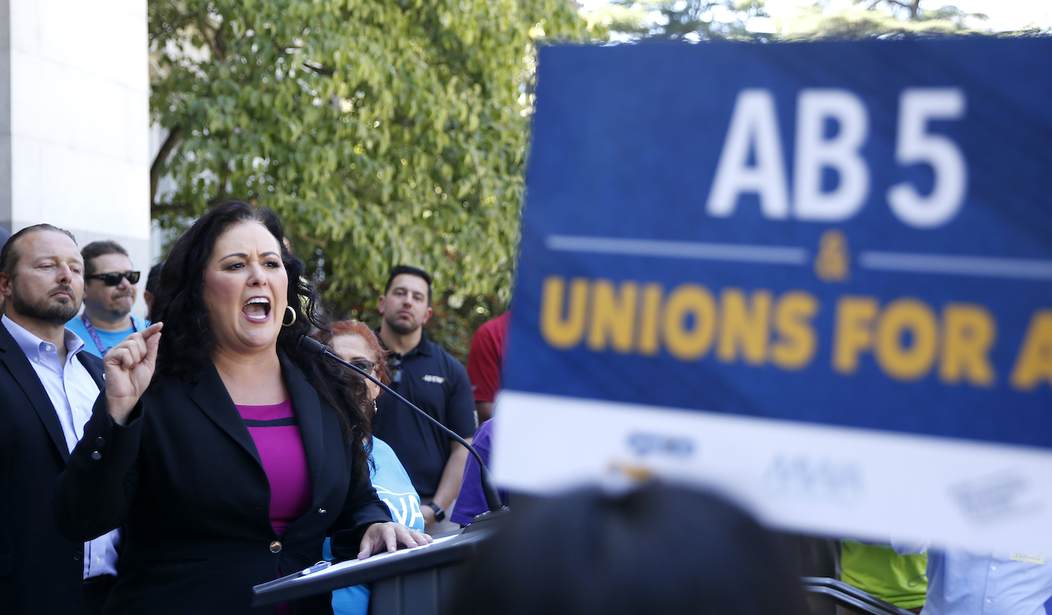Editor's Note: This piece was authored by Young Voices Advocate Christian Watson.
If you’re a rideshare driver in California, the state government claims you’re being treated unfairly. But really, paternalistic lawmakers are just trying to strangle businesses.
On May 5, California Attorney General Xavier Becerra, along with Los Angeles, San Francisco and San Diego, filed a lawsuit against Uber and Lyft for failing to provide their drivers with employee benefits. In his infinite wisdom, Becerra said the suit “asserts that Uber and Lyft gain an unfair and unlawful competitive advantage by inappropriately classifying massive numbers of California drivers as independent contractors.” Oh, mercy.
Haven’t lawmakers bludgeoned California’s economy enough in the past year? Between driving Tesla away to states like Nevada or Texas (due to restrictions that forced Tesla to remain closed in California during the pandemic) and California coming in last in overall business friendliness in 2019, you’d think the madness would end. But now, amid a global pandemic, it’s decided to embark on another costly crusade. And hard-working Californians, whom lawmakers claim to want to help, will suffer for it.
Uber and Lyft drivers are generally considered contractors, which is necessarily distinct from full employment, in terms of whether or not they receive benefits like health care coverage. But the California law Assembly Bill 5, which took effect this year, says “workers can generally only be considered contractors if they perform duties outside the usual course of a company’s business.” That, of course, has complicated the gig economy’s survival in the state. Becerra and co. claim that Uber and Lyft supposedly “take the worker’s labor, but they won’t accept the worker’s protections.” Uber, of course, is fighting everything. In response to the suit, Uber argued that in a COVID-19 economy, “we need to make it easier, not harder, for people to quickly start earning.”
Recommended
Uber’s right.
Becerra, and AB-5, treat ridesharing like a traditional job, in which there’s a workplace and a power dynamic. But ridesharing is the opposite of the traditional workplace: The driver chooses their hours, work condition and customers. With this in mind, California’s determination to treat gig workers like traditional employees will only hurt these drivers — as well as consumers.
After all, the requirements of employee classification are associated with a host of higher costs, like health care, unemployment insurance, and so forth. As an article in the Washington Examiner explains, because of these added costs,“Uber and Lyft will have a huge incentive to be more controlling of drivers’ schedules and locations served.” With that comes less flexibility, higher consumer costs and ultimately, less take-home income for the driver. Nobody wins.
That’s a shame, because Uber’s role as a supplementary source of income—especially in a cratering economy—is vital to the survival of many gig-workers. As the country reels from more than 82,000 COVID-related deaths and unprecedented unemployment figures, most lawmakers are focused on providing some form of economic relief to Americans. If our politics were like a game show, California would be vying against COVID-19 for the first place in the category of “Who Can Produce The Most Economic Devastation?”. Because that’s exactly the risk Beccera’s sanctimonious crusade poses for the ridesharing economy.
This isn’t alarmism. It’s already happening. COVID-19’s economic impact has already left its mark on Uber and Lyft, without California’s meddling. The New York Times reported that “spending on Uber’s rides dropped about 83 percent in March,” which has bludgeoned the industry. California shouldn’t pile on the hurt, but it just can’t seem to help itself.
There is, however, good news for economically-troubled rideshare drivers. Fears of the virus has prompted consumers to turn to Uber Eats and Lyft’s new grocery delivery service, “Essential Deliveries.” Since the pandemic started, The Verge reports that “Uber Eats saw an acceleration in demand since mid-March with 89 percent year-over-year gross bookings growth in April excluding India.” And Essential Deliveries is “aimed at helping drivers earn money” during the crisis and “will tap drivers to deliver ‘essential’ items like groceries, medical supplies, and home goods.”
But beneath the weight of California’s legal challenge, who knows what will happen to these innovative work-arounds of the current economic crisis? It’s all the more reason to leave gig workers alone.
Workers across the country are trudging through post-pandemic America. We’re all wondering when, if ever, we can embrace our elderly relatives, if our jobs will look the same once life returns to normal, and even what “normal” means anymore. With all of that to worry about, the last thing gig workers need is the California government pushing them out of a job in the name of “fairness.”
Christian Watson is a political writer based out of Georgia and a Young Voices Advocate. He can be found on Twitter at @OfficialCWatson.

























Join the conversation as a VIP Member